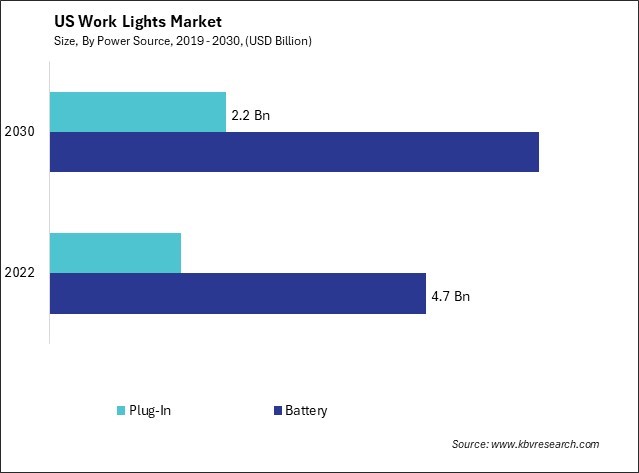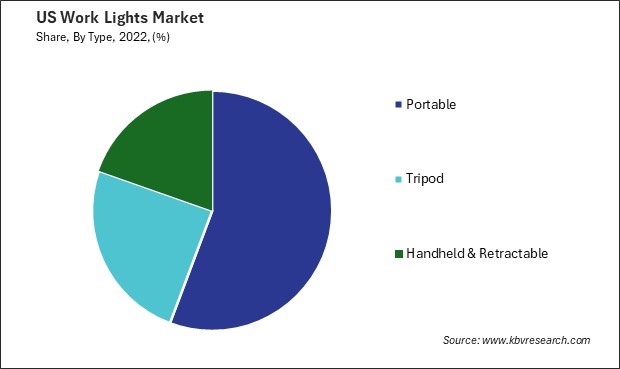The United States (US) Work Lights Market Market size is expected to reach $8.4 Billion by 2030, rising at a market growth of 3.5% CAGR during the forecast period. In the year 2022, the market attained a volume of 104233.4 thousand units, experiencing a growth of 4.1% (2019-2022).
The work lights market in the United States has experienced significant growth and diversification in recent years, driven by the expanding industrial, construction, and automotive sectors. The automotive industry also contributes significantly to the demand for work lights in the U.S. The need for well-lit workspaces in auto repair shops, garages, and manufacturing facilities has increased the adoption of specialized work lights designed for automotive applications. The adoption of smart technology is also making its way into the work lights market. Some products feature Bluetooth connectivity or remote-control capabilities, allowing American users to adjust brightness levels, set timers, or even change light colors using mobile devices.

Moreover, the rise of the DIY culture among American consumers has further fueled the demand for work lights. As more individuals engage in home improvement projects and outdoor activities, portable and versatile work lights become essential tools. The versatility of these lights, often featuring adjustable brightness levels and various mounting options, caters to the diverse needs of DIY enthusiasts and professionals alike. Workplace safety regulations and initiatives have fueled the adoption of advanced work lights. U.S. industries are increasingly investing in lighting solutions that improve visibility and adhere to safety standards, reducing the risk of accidents and injuries.
The COVID-19 pandemic has caused disruptions in supply chains, leading to challenges in manufacturing and distribution. Lockdowns and restrictions on construction activities have temporarily slowed down the demand for work lights in the U.S. Additionally, economic uncertainties have influenced purchasing decisions, with some businesses delaying non-essential expenditures, including investments in new lighting equipment.
The construction industry in the United States has experienced significant growth in recent years, driving expansion in the work lights market. The demand for efficient and reliable illumination solutions has become paramount as construction activities extend beyond daylight hours. As construction projects across the U.S. continue to rise, there is a heightened need for effective lighting solutions to ensure uninterrupted workflow and, more importantly, the safety of workers. Work lights have become indispensable tools on construction sites, providing visibility in poorly lit areas and aiding in precision tasks during evening shifts in the U.S.
Expanding the construction industry, particularly in urban development projects, commercial infrastructure, and residential construction, has fueled the demand for advanced, energy-efficient work lights. Urban development projects, such as office buildings, residential complexes, and retail spaces, have been particularly instrumental in shaping the construction landscape. The need for round-the-clock construction activities to meet deadlines and optimize project timelines has intensified the reliance on work lights in the U.S.
According to the U.S. Census Bureau, construction spending during November 2023 was estimated at a seasonally adjusted annual rate of $2,050.1 billion, 0.4 % above the revised October estimate of $2,042.5 billion. The November figure is 11.3 % above the November 2022 estimate of $1,842.2 billion. During the first eleven months of this year, construction spending amounted to $1,817.1 billion, 6.2 % above the $1,711.1 billion for the same period in 2022. The upward trend in construction spending underscores the industry's robust performance and its impact on the burgeoning work lights market in the U.S.
Government initiatives and regulations pertaining to workplace safety have also played a pivotal role in shaping the work lights market in the U.S. Strict adherence to safety standards has made it imperative for construction sites to incorporate high-quality lighting systems, ensuring optimal visibility and reducing the risk of accidents. Thus, the surge in construction activities in the United States, driven by urban development and infrastructure projects, has propelled the demand for advanced and energy-efficient work lights.
The work lights market in the United States is experiencing a substantial surge in demand for tripods, reflecting a growing trend in the industry. As workplaces and job sites become increasingly dynamic, the need for versatile and adjustable lighting solutions has intensified. One of the driving factors behind the increasing demand for tripods in the U.S. work lights market is the emphasis on enhanced visibility and safety in various industries. Workers across construction, manufacturing, and maintenance sectors require adequate illumination for intricate tasks and hazard recognition. Tripods provide a convenient and efficient solution by allowing Americans to position lights at optimal angles and heights, ensuring comprehensive work area coverage.
Furthermore, the U.S. work lights market is witnessing a rise in LED technology adoption, contributing to the tripod's popularity. LED work lights offer energy efficiency, longevity, and superior brightness, making them the preferred choice for many professionals. Tripods complement these advanced lighting solutions by providing a stable base for mounting powerful LED work lights, catering to the need for reliable and efficient illumination.
The shift towards remote and flexible work arrangements has also fueled the demand for portable lighting solutions. As businesses and individuals prioritize eco-friendly practices, the efficiency of LED work lights becomes a significant factor in their adoption. Therefore, the surge in demand for tripods in the U.S. work lights market is driven by the growing emphasis on enhanced visibility and safety, particularly in dynamic workplaces.

The work lights market in the United States is a dynamic and competitive industry driven by the diverse needs of various sectors such as construction, automotive, manufacturing, and outdoor activities. In this thriving industry, several companies have established themselves as key players, each bringing unique offerings to cater to the specific demands of American consumers.
One prominent player in the U.S. work lights market is Milwaukee Tool. Renowned for its high-quality and durable products, Milwaukee Tool has become a go-to choice for professionals and DIY enthusiasts. The company's extensive range of work lights encompasses corded and cordless options, providing versatility for job sites and applications. Milwaukee Tool's commitment to innovation and advanced LED technology has solidified its position in the industry.
Ingersoll Rand, a global industrial company, has a significant presence in the U.S. work lights market. Leveraging its expertise in compressed air systems and power tools, Ingersoll Rand offers a range of work lights that align with the needs of professionals across industries. The company's emphasis on efficiency and user-friendly features contributes to its success in the competitive industry.
Another noteworthy participant in the U.S. work lights sector is DEWALT. As a well-known brand in the power tools industry, DEWALT brings its reputation for reliability to the work lights market. The company offers a broad spectrum of lighting solutions designed to meet the stringent requirements of construction professionals and tradespeople. DEWALT's focus on rugged design and functionality resonates with users seeking durable and efficient work lights for their projects.
An emerging player making strides in the U.S. work lights segment is CAT (Caterpillar Inc.). CAT has expanded its product offerings to include durable and reliable work lights, leveraging its brand recognition in the construction and heavy equipment industry. The company's focus on delivering robust lighting solutions suitable for challenging work environments positions it as a notable contender in the industry. With a focus on innovation, durability, and meeting the diverse needs of professionals, these companies shape the landscape of the U.S. work lights market, providing consumers with many options to illuminate their workspaces effectively.
By Power Source
By Type
By Light Technology
By End-Use
Our team of dedicated experts can provide you with attractive expansion opportunities for your business.

